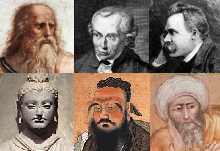Philosophy:Becoming
| Part of a series on |
| Philosophy |
|---|
 |
| Philosophers |
| Periods |
| Branches |
In philosophy, becoming is a concept referring to constant change opposed to being. It is the focus of process philosophy as a whole, or with the related study of process theology.[1]
History
Nietzsche and Kierkegaard
In his written works, Friedrich Nietzsche proposed what has been regarded as a philosophy of becoming that encompasses a "naturalistic doctrine intended to counter the metaphysical preoccupation with being", and a theory of "the incessant shift of perspectives and interpretations in a world that lacks a grounding essence".[2]
Søren Kierkegaard posed questions of individual becoming in Christianity which were opposed to the ancient Greek philosophers' focus on the indifferent becoming of the cosmos. However, he established as much of a focus on aporia as Heraclitus and others previously had, such as in his concept of the leap of faith which marks an individual becoming.[3] As well as this, Kierkegaard opposed his philosophy to Hegel's system of philosophy approaching becoming and difference for what he saw as a "dialectical conflation of becoming and rationality", making the system take upon the same trait of motionlessness as Parmenides' system.[4]
References
- ↑ Seibt, Johanna (15 October 2012). "Process Philosophy". The Stanford Encyclopedia of Philosophy (Fall 2013 Edition). http://plato.stanford.edu/archives/fall2013/entries/process-philosophy/. Retrieved 30 April 2014.
- ↑ Cox, Christoph (1999). Nietzsche: Naturalism and Interpretation. University of California Press. p. 170. ISBN 0-520-21553-2.
- ↑ Carlisle, Claire (2005). Kierkegaard's Philosophy of Becoming: Movements and Positions. State University of New York Press. p. 9-10. ISBN 0-7914-6547-0.
- ↑ Carlisle, Claire (2005). Kierkegaard's Philosophy of Becoming: Movements and Positions. State University of New York Press. p. 15. ISBN 0-7914-6547-0.
